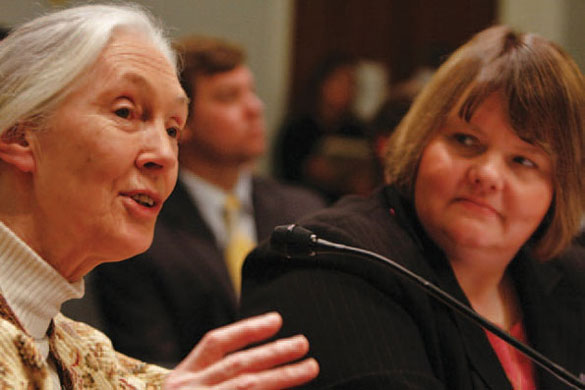AVMA testifies against keeping primates as pets
Citing concerns about the spread of disease and injury, inhumane treatment of animals, and ecologic damage, Dr. Gail C. Golab, director of the AVMA Animal Welfare Division, recently spoke before a House subcommittee on the dangers of private ownership of nonhuman primates by unlicensed individuals.
The House Committee on Natural Resources' Subcommittee on Fisheries, Wildlife, and Oceans held a hearing March 11 on the Captive Primate Safety Act (H.R. 2964). The legislation would amend the Lacey Act Amendments of 1981, making chimpanzees, monkeys, and other nonhuman primates prohibited wildlife species, thus strictly limiting commerce in pet primates.
Persons or agencies licensed or registered by the government, such as zoos and research facilities, are exempt under the proposal.
Born Free USA and Captive Wild Animal Protection Coalition estimate that more than 15,000 primates are privately owned in the United States.
Between 1995 and 2005, there were 132 injuries or escapes by primates in the United States, according to the coalition. Also, some 80 percent of health and behavioral issues pertaining to primates involve those kept as pets.
Dr. Golab told subcommittee members that the evidence is clear that primates kept as pets are unsafe. Not only are these animals a physical threat, they may also be a source of the herpes B virus and other zoonotic pathogens. "Make no mistake about it," Dr. Golab, said, "nonhuman primates kept as pets—while cute and often very entertaining—can also pose serious injury risks for their human caretakers and other domestic animals."
For these reasons, the AVMA opposes private ownership of these animals as well as their use as assistance or service animals, Dr. Golab said. The AVMA does strongly support animal health professionals who work with primates in conservation and biomedical research efforts, she added.
Speaking on behalf of the Association of Zoos and Aquariums, Steve Ross said the bill is a much-needed step toward stemming the tide of the growing exotic animal pet trade. "This legislation takes aim at the increase in the number of unregulated and untrained individuals who are maintaining nonhuman primates as personal pets," Ross said.
Also testifying in favor of the bill was renowned primatologist Jane Goodall, PhD. "It is time for us to end this dangerous, selfish, and inhumane trade. Nonhuman primates of all sizes have complex minds, personalities, and emotions and do not belong in our homes and pet shops," Dr. Goodall said.

The sole dissenting view was offered by Sian Evans, PhD, of Uniting a Proactive Primate and Exotic Animal Appeal, an organization supporting private ownership of primates. Dr. Evans said there is no scientific evidence supporting the claims of the other panelists that primates are a serious physical or biologic threat to their human owners.
The housing provided by primate pet owners sometimes surpasses that offered by zoos and is "superior" to conditions in any research laboratory Dr. Evans has visited, she said. Furthermore, Dr. Evans knows primate owners who frequently cross state lines to obtain quality veterinary care for their pets.
"It is ironic that the most likely outcome of the passage of this bill would only compromise the health and emotional well-being of pet primates and the ability of their owners to provide the best care for their pets," Dr. Evans said.
Dr. Golab questioned whether keeping a pet for which the owner's only option was to travel to another state for basic veterinary care was really in the best interest of that pet. Health certificates for animals traveling state-to-state are often required, she added, meaning the primate would have to be examined in the state in which the owner resides before the owner can legally travel with the animal across state lines.
The Senate version of the Captive Primate Safety Act (S. 1498) was passed by the Committee on Environment and Public Works in October 2007 and is awaiting a vote by the full Senate.